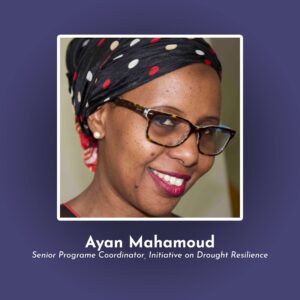
Ep 39 | Ayan Mahamoud
Ayan Mahamoud: “East Africa and the Poly-Crisis”
On this episode, Nate talks with Ayan Mahamoud, a climate and resilience planner from Djibouti. They discuss the growing challenge the poly-crisis poses for the Global South and how climate change is already creating challenges for people (and animals) in East Africa.
In many ways, the discussions in our world are not only energy blind but also blind to accelerating threats to nations outside our own. What does managing and coordinating responses look like? What can we learn from communities already dealing with increasing poverty and climate impacts?
About Ayan Mahamoud
Ayan Mahamoud (PhD) is the Head of the Socioeconomic, Policy, Research and Marketing Department of ICPALD. She is an expert in Regional and Transboundary Polycrisis, Climate Security and Climate Fragility and their policy dimensions for sustained coordinated action. She contributes to the IGAD Climate Security Agenda and collaborates with institutions across the IGAD Member States, Divisions, Specialised Institutions, the UN Office of the Special Envoy, UNDP, CGIAR and various independent think tanks such as Adelphi, the Clingendael Institute. She also manages the USAID Programme Portfolio at IGAD and deals with issues related to Resilience/Climate Fragility Risks/Climate Adaptation/Dryland Development, Cross-Border Health, Countering Violent Extremism, and Conflict Prevention/Early Warning.
In French, we have a motto that says that a simple drawing is often better than a long explanation. Jean-Marc Jancovici Carbone 4 President
That’s very understandable because with left atmosphere thinking, one of the problems is that you see everything as a series of problems that must have solutions. Iain McGilchrist Neuroscientist and Philosopher
We can’t have hundreds and hundreds of real relationships that are healthy because that requires time and effort and full attention and awareness of being in real relationship and conversation with the other human. Nate Hagens Director of ISEOF
This is the crux of the whole problem. Individual parts of nature are more valuable than the biocomplexity of nature. Thomas Crowther Founder Restor
Show Notes & Links to Learn More
Download transcript00:35 – Ayan’s Info
02:43 – IGAD
03:57 – Fifth fatal rainy season in the Horn of Africa
05:58 – How the Russian/Ukraine war is affecting food prices
06:30 – First shipments of grain leaving Turkey
07:10 – Population in the Horn of Africa
07:49 – Kenya imports as much grain as it produces
12:10 – Extreme temperatures affect livestock
13:57 – Desert Locust Invasion 2019
15:05 – The future is already here it’s just not evenly distributed -William Gibson
15:36 – Pakistan floods
20:30 – The global north burned 90% of carbon but impacts are disproportionately felt by the global south
21:53 – Kenyan pastoral community displaced
22:48 – Ozone layer
25:15 – Widening wealth gap in countries in the global south
27:33 – COP 27 in Sharm el-Sheikh
27:59 – Djibouti has already past 1.5 degree increase
28:59 – Lack of peace in Congo
29:43 – Map of where rare earths are found
32:57 – China Belt and Road Initiative
35:18 – 1.25 dollars/day as a threshold for poverty
38:30 – Wangari Maathai
40:27 – Environmental ethic in the Quran
44:02 – Ebola outbreak in Uganda
44:25 – African countries handled COVID crisis better than much of the global north
54:28 – Martha’s Vineyard community supporting migrants
55:20 – Issues with supply chains during covid
56:20 – Ethiopian airlines the only airline that remained running with cargo
59:10 – African Economic Commission
1:00:02 – The value of Indigeous Knowledge
1:01:00 – Issa Community
1:08:25 – Pandemic Task Force was discarded just before COVID







